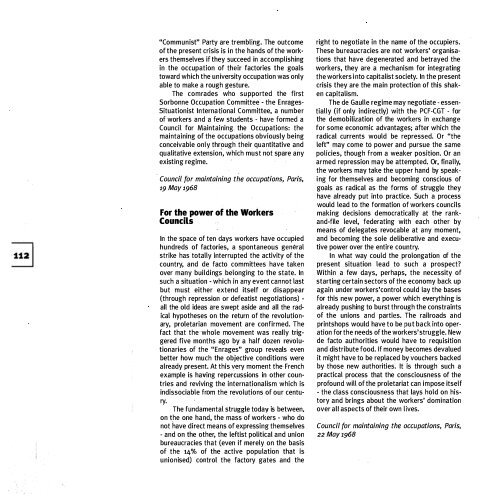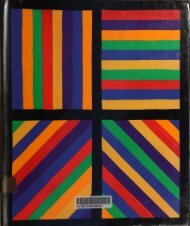SITUATIONISTS AND THE 1£CH MAY 1968
umMYFs
umMYFs
Create successful ePaper yourself
Turn your PDF publications into a flip-book with our unique Google optimized e-Paper software.
"Communist" Party are trembling. The outcome<br />
of the present crisis is in the hands of the work·<br />
ers themselves if they succeed in accomplishing<br />
in the occupation of their factories the goals<br />
toward which the university occupation was only<br />
able to make a rough gesture.<br />
The comrades who supported the first<br />
Sorbonne Occupation Committee - the Enrages<br />
Situationist International Committee, a number<br />
of workers and a few students - have formed a<br />
Council for Maintaining. the Occupations: the<br />
maintaining of the occupations obviously being<br />
conceivable only through their quantitative and<br />
qualitative extension, which must not spare any<br />
existing regime.<br />
· Council fo r maintaining the occupations, Paris,<br />
19 May <strong>1968</strong><br />
For the power of the Workers<br />
Councils<br />
In the space of ten days workers have occupied<br />
hundreds of factories, a spontaneous genl'!ral<br />
strike has totally interrupted the activity of the<br />
country, and de facto committees have taken<br />
over many buildings belonging to the state. In<br />
such a situation -which in any event cannot last<br />
but must either extend itself or disappear<br />
(through repression or defeatist negotiations) -<br />
all the old ideas are swept aside and all the radical<br />
hypotheses on the return of the revolutionary,<br />
proletarian movement are confirmed. The<br />
fact that the whole movement was really triggered<br />
five months ago by a half dozen revolutionaries<br />
of the "Enrages" group reveals even<br />
better how much the objective conditions were<br />
already present. At this very moment the French<br />
example is having repercussions in other countries<br />
and reviving the internationalism which is<br />
indissociable fr.om the revolutions of our century.<br />
The fundamental struggle today is between,<br />
on the one hand, the mass of workers - who do<br />
not have direct means of expressing themselves<br />
- and on the other, the leftist political and union<br />
bureaucracies that (even if merely on the basis<br />
of the 14°/o of the active population that is<br />
unionised) control the factory gates and the<br />
right to negotiate in the name of the occupiers.<br />
These bureaucracies are not workers' organisations<br />
that have degenerated and betrayed the<br />
workers, they are a mechanism for integrating<br />
the workers into capitalist society. In the present<br />
crisis they are the main protection of this shaken<br />
capitalism.<br />
The de Gaulle regime may negotiate - essentially<br />
(if only indirectly) with the PCF-CGT - for<br />
the demobilization of the workers in exchange<br />
for some economic advantages; after which the<br />
radical currents would be repressed. Or "the<br />
left" may come to power and pursue the same<br />
policies, though from a weaker position. Or an<br />
armed repression may be attempted. Or, finally,<br />
the workers may take the upper hand by speaking<br />
for themselves and becoming conscious of<br />
goals as radical as the forms of struggle they<br />
have already put into practice. Such a process<br />
would lead to the formation of workers councils<br />
making decisions democratically at the rankand-file<br />
level, federating with each other by<br />
means of delegates revocable at any moment,<br />
and becoming the sole deliberative and executive<br />
power over the entire country.<br />
In what way could the prolongation of the<br />
present situation lead to such a prospect?<br />
Within a few days, perhaps, the necessity of<br />
starting certain sectors of the economy back up<br />
again under workers' control could lay the bases<br />
for this new power, a power which everything is<br />
already pushing to burst through the constraints<br />
of the unions and parties. The railroads ahd<br />
printshops would have to be put back into operation<br />
for the needs of the workers' struggle. New<br />
de facto authorities would have to requisition<br />
and distribute food. If money becomes devalued<br />
it might have to be replaced by vouchers backed<br />
by those new authorities. lt is through such a<br />
practical process that the consciousness of the<br />
profound will of the proletariat can impose itself<br />
- the class consciousness that lays hold on history<br />
and brings about the workers' domination<br />
over all aspects of their own lives.<br />
Council for maintaining the occupations, Paris,<br />
22 May <strong>1968</strong>










